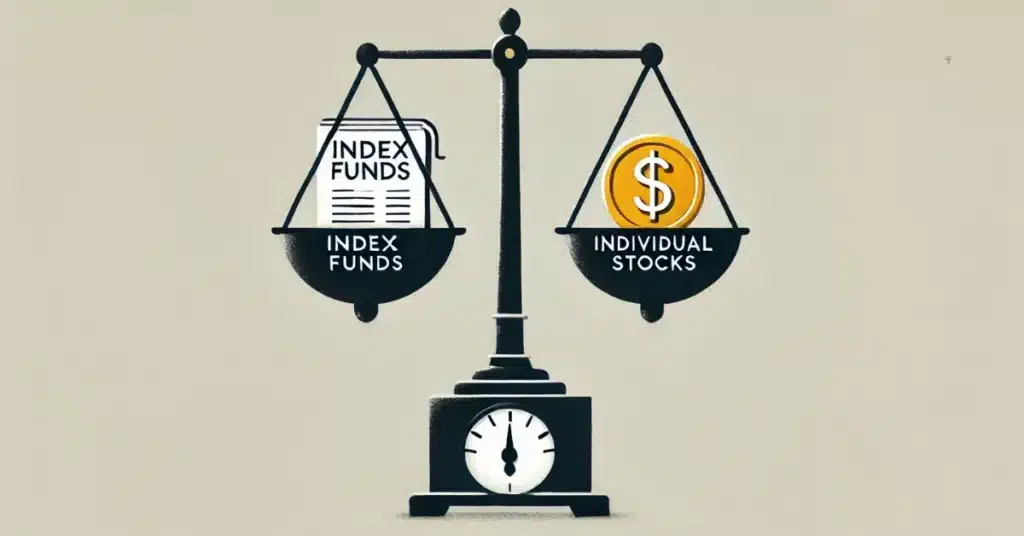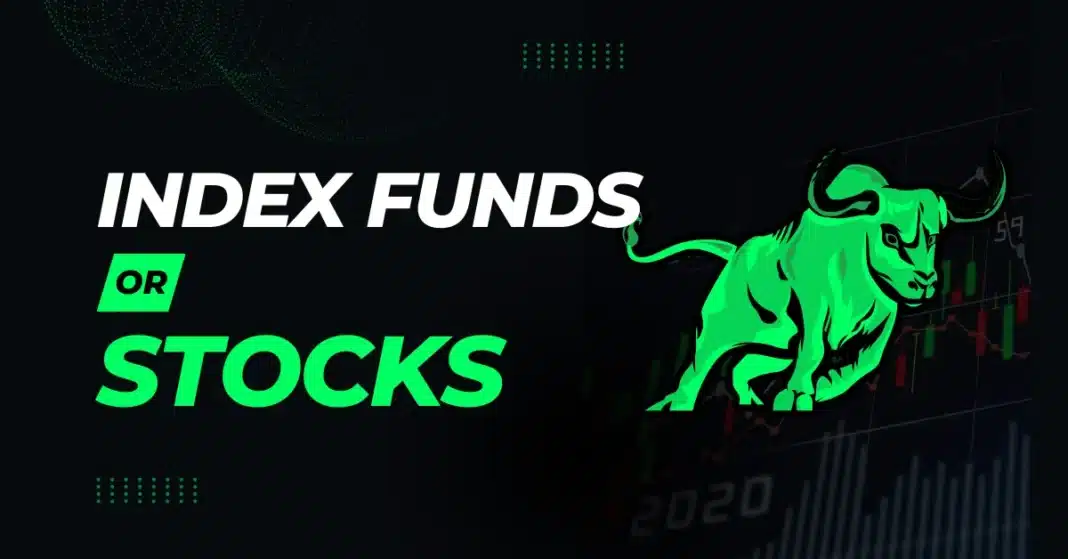When it comes to growing your wealth through investing, one question consistently stands out: Index Funds or Individual Stocks: Which Is the Better Investment? This decision is not only crucial for beginners but also for seasoned investors. The answer largely depends on individual financial goals, risk tolerance, and investment strategy. In this blog post, we’ll break down the differences between index funds and individual stocks, weigh the advantages and disadvantages of each, and help you choose which option is best suited for your financial journey.
Understanding Index Funds or Individual Stocks

Investors are often faced with two distinct choices: index funds or individual stocks. While index funds provide a more passive, diversified approach, individual stocks offer more control and the potential for higher returns. However, these benefits also come with higher risks. To make an informed decision, it’s important to delve into the pros and cons of both.
What Are Index Funds?
Index funds are designed to replicate the performance of a specific market index, such as the S&P 500. They provide instant diversification by investing in a broad range of stocks that mirror the components of a given index. Here’s what makes index funds a popular choice:
Advantages of Index Funds:
- Diversification: By investing in numerous stocks, index funds spread risk across various sectors, reducing the impact of any single stock’s poor performance.
- Lower Costs: Index funds typically have lower fees due to passive management. There’s no need for active trading, which cuts down on transaction costs.
- Simplicity: Index funds are an excellent option for investors who prefer a “set it and forget it” approach.
Disadvantages of Index Funds:
- Limited Growth Potential: Since index funds track the overall market, they provide steady, but often modest, returns. Investors seeking explosive growth might find them too conservative.
- Market Risk: Index funds are still susceptible to market-wide downturns, which can affect the overall value of the fund.
- No Control Over Holdings: With index funds, investors cannot choose which stocks to include in the portfolio.
READ ALSO: Investment Portfolio Diversification: Why It’s Important and How to Achieve It
What Are Individual Stocks?
Individual stocks refer to buying shares of specific companies. This method requires research, timing, and a solid understanding of market trends. For those seeking more personalized control over their investments, this route might be appealing. However, it also carries significant risks.
Advantages of Individual Stocks:
- Potential for High Returns: If you pick the right company, your investment could outperform the market, resulting in significant returns.
- Control: Investing in individual stocks allows you to hand-pick companies, aligning your investments with your personal beliefs or insights.
- Dividend Income: Many individual stocks offer dividends, which provide an additional stream of income.
Disadvantages of Individual Stocks:
- Higher Risk: With individual stocks, poor performance can drastically impact your portfolio. This investment type demands a high tolerance for risk.
- Time-Consuming: Managing individual stocks requires extensive research, regular monitoring, and an active trading strategy.
- Lack of Diversification: Investing in individual stocks means you may have a concentrated portfolio, exposing you to greater market volatility.
Index Funds or Individual Stocks: Which Is the Better Investment?
Deciding between index funds or individual stocks involves analyzing several factors such as risk, potential returns, and time commitment. For risk-averse investors, index funds offer peace of mind and steady growth over time. In contrast, individual stocks are attractive to investors willing to take on more risk for the potential of higher returns.
Risk and Reward
Index Funds provide stability and diversification, making them less risky. However, their potential rewards are also limited since they mirror market performance. Individual Stocks, on the other hand, can yield much higher returns if you choose wisely, but they come with the possibility of losing your entire investment in one company.
Cost Efficiency
Index funds are generally cheaper to invest in. They carry lower fees because they do not require frequent trading or active management. Individual stocks, however, often involve higher transaction fees, especially for those who trade regularly.
Time and Effort
Investing in index funds is effortless and requires little oversight. Once you invest, the fund automatically rebalances to follow the index. In contrast, individual stocks require constant attention, research, and adjustments, which can be time-consuming for those with less experience or a busy schedule.
Which Is Better for Long-Term Investors?
For long-term investors, index funds are often the safer bet. They offer steady returns with lower risk, ideal for individuals looking to grow their wealth gradually. The diversification provided by index funds also mitigates the risk of losing a significant portion of your portfolio due to the poor performance of a single stock.
However, if you have the time to actively manage your portfolio and are comfortable with risk, individual stocks could potentially provide higher returns. Just be aware that success in stock picking requires careful research and a thorough understanding of the market.
Can You Combine Index Funds and Individual Stocks?
Yes! Many investors choose to allocate a portion of their portfolio to both index funds and individual stocks. This allows them to benefit from the stability of index funds while also pursuing the high-return potential of individual stocks.
Diversification Strategy:
- Allocate 70-80% to Index Funds: For stable, long-term growth, most of your investments can go into index funds, where you benefit from broad market exposure.
- Allocate 20-30% to Individual Stocks: For higher returns, you can dedicate a smaller portion of your portfolio to individual stocks in companies that you believe will outperform the market.
By combining these two approaches, you can balance risk and reward in a way that suits your financial goals.
Internal and External Resources
To expand on this topic further, consider checking out Vanguard’s Guide to Index Funds for more insights on how index funds work. If you’re interested in stock picking, The Motley Fool offers expert advice and stock market analysis to help you get started.
For those wanting to delve deeper into diversified strategies, we recommend reading this article from Investopedia to understand how to balance a portfolio with both index funds and individual stocks.
Conclusion: What’s the Right Choice for You?
Choosing between index funds or individual stocks comes down to your personal risk tolerance, time availability, and investment goals. If you’re looking for a low-risk, low-maintenance option, index funds offer a hassle-free way to grow wealth over the long term. If you’re prepared to take a more active role and seek higher returns, individual stocks might be more suitable.
For most investors, a balanced approach combining both index funds and individual stocks can provide a good mix of security and growth potential. By understanding the unique benefits and risks of each, you can tailor your investment strategy to suit your financial needs.
FAQs
- What is the main difference between index funds and individual stocks? Index funds offer diversification by investing in a broad market index, while individual stocks involve investing in single companies, often with higher risk but potentially greater returns.
- Are index funds better for beginners? Yes, index funds are ideal for beginners due to their simplicity, lower risk, and minimal management requirements.
- Can I invest in both index funds and individual stocks? Yes, many investors diversify their portfolios by investing in both, balancing the stability of index funds with the high-return potential of individual stocks.
- Do index funds have lower fees? Yes, index funds typically have lower fees since they are passively managed, whereas individual stocks may involve higher transaction costs.
- Which offers better returns: index funds or individual stocks? Individual stocks can offer higher returns but come with higher risk. Index funds provide steady returns but are less likely to result in massive gains.
- What is the risk of investing in individual stocks? Investing in individual stocks carries the risk of significant losses, especially if the companies you choose do not perform well.



